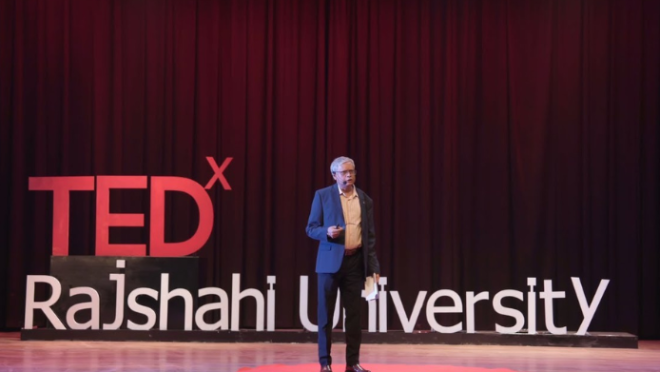Your own cosmic journey: Why you should check out the latest TED Talk by RU VC Dr Saleh Hasan Naqib
Your own cosmic journey: Why you should check out the latest TED Talk by RU VC Dr Saleh Hasan Naqib

At Kazi Nazrul Islam Auditorium of Rajshahi University, a man walks slowly across the stage, his silver hair catching the spotlight, his voice calm and steady. Behind him, a map of the cosmos glows—a sprawling visual of the “visible universe,” born 13.8 billion years ago. It has been expanding ever since.
“We started this talk probably a minute or two ago,” says Dr Saleh Hasan Naqib, “and by this time, the universe has grown one or two light-minutes.” It’s a casual remark that carries astonishing weight. One light-minute spans 18 million kilometres (the speed of light is three hundred thousand kilometres per second).
Dr Saleh Hasan Naqib, Vice Chancellor of Rajshahi University and a physicist with a doctorate from the University of Cambridge, specialises in superconductivity and computational physics. But in this TEDx talk—Your Own Cosmic Journey—he doesn’t bog you down with physics jargon or technicalities; the lecture flows smoothly, especially if you’re familiar with some high school physics.
Delivered on 2 February 2025 at TEDx Rajshahi University and later published on TED’s official YouTube channel on 19 May, the talk invites you to pause and reflect on how we are all part of a grand cosmic journey.
The humble man, with hair and moustache all white—probably a very standard image of a wise physics teacher—calmly proceeds with his lecture. I couldn’t help but notice a bit of white dust smudged on the right arm of the suit Professor Saleh was wearing, but he seemed entirely unbothered by such a petty issue and continued his lecture with grace.
He goes on to explain how, after the Big Bang, the elements that make up the universe were formed—from hydrogen to the heavier ones—through nuclear fusion. He takes the Sun, a typical star and the closest one we have, as an example to show how its core functions as a massive nuclear reactor. The same process created the elements, including radioactive ones, that exist within our own human bodies.
“We are made of stardust. All of us are part of some star,” Professor Saleh remarks, which, honestly, sounds too good to be true.
And it quickly becomes evident where he is heading with that—towards us, the human beings, and our place in the universe.
The profound passion with which Professor Saleh speaks makes the 20-minute talk a real delight.
Currently, he serves as the Vice-Chancellor of Rajshahi University and is a highly accomplished researcher. His main research interests include superconductivity and computational physics. Dr Naqib is a member of several prestigious bodies, including the Institute of Physics, American Physical Society, Cambridge Philosophical Society, Cambridge Commonwealth Trust, and Bangladesh Physical Society, among others.
He has received numerous accolades, including the Bangladesh Academy of Sciences (BAS) Gold Medal, the Razzaq-Shamsun Physics Research Award, and the S N Nahar Physics Teacher of the Year Award.
This talk was given at a TEDx event using the TED conference format but was independently organised by a local community.


